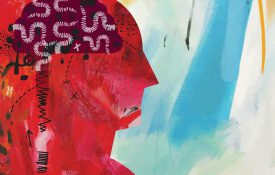-

SSCP Award
Are you a member of the Society for a Science of Clinical Psychology (SSCP)? If so, you are eligible to apply for the annual SSCP student poster session at the APS Annual Convention. Cash awards Visit Page
-
It’s About Time
From reminiscing about the past, to scurrying to work to be on time, to planning for retirement, time affects our thoughts, feelings, and behaviors on a variety of levels. In a cross-cutting theme program, "The Meaning of Time," at the 2016 APS Annual Convention in Chicago, psychological scientists shared research on the ways humans think about the past, present, and future. APS Fellow Laura L. Carstensen, founding director of the Stanford Center on Longevity, presented findings emanating from her socioemotional selectivity theory, which maintains that as time horizons shrink as we age, we become increasingly selective about our social networks and our experiences.
-
Memories of Spence
APS Past President Janet Taylor Spence, who died in March 2015 at the age of 91, loved the pursuit of psychological science and inspired all who worked with her. In a special symposium chaired by another APS Past President, Kay Deaux, and APS Fellow Lucia Albino Gilbert, scientists shared their perspectives on Spence’s wide-ranging contributions to psychological science. Spence’s contributions to the field, first in the area of anxiety and later in the realm of gender, have been far-reaching. Her research on anxiety included the development of the Taylor Manifest Anxiety Scale, a method for relating dispositional levels of anxiety to performance.
-
Breaking Free From Bad Behaviors
Many people try their best to eat healthy and exercise regularly. Others strive to be good environmental stewards, cutting down their usage of electricity and water. And still others intend to treat everyone fairly, regardless of race, gender, or sexual orientation. But those efforts require a level of self-control that can easily be drained. Old habits die hard. In a cross-cutting theme program sponsored by the NIH Common Fund Science of Behavior Change and titled "Breaking Free — Intersecting Perspectives on the Science of Behavior Change" at the 2016 APS Annual Convention in Chicago, psychological scientists shared cutting-edge research on halting and reversing destructive behavior.
-
Deploying Technology to Revolutionize Science
The technology revolution is raising new questions for both the science and the applications of psychology. Can mental health care be delivered remotely over the Internet? Can we use neuroimaging technology to adaptively control our own brain activity? How can technology be used to study people in settings far more natural than a lab? In a cross-cutting theme program, "Advancing Psychological Science Through Technology," at the 2016 APS Annual Convention in Chicago, leading researchers opened a window into the future role of technology in psychological science.
-
Bower Reflects on Integrating Two Theoretical Frameworks
As a Yale university graduate student back in the mid 1950s, APS Past President and William James Fellow Gordon H. Bower was being indoctrinated into the then-dominant learning theory of Clark Hull, who sought to explain learning and motivation by scientific laws of behavior. But he became a devotee of William K. Estes’s statistical theory of learning after meeting him at a 1957 workshop. At the APS-Psychonomic Society W. K. & K. W. Estes Lecture at the 2016 APS Convention in Chicago, Bower delivered a 60-year retrospective on his attempts to integrate or translate Hull’s theory into Estes’s statistical framework.

